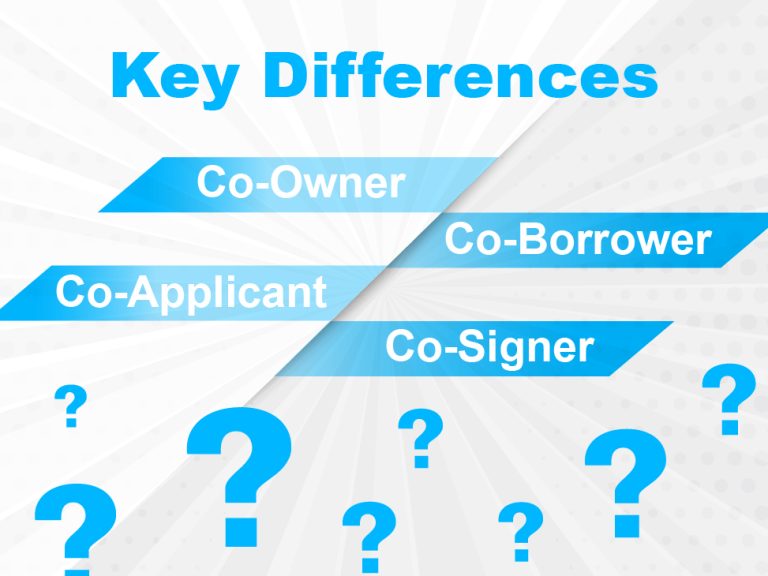Getting home loan is very BASIC now
Get a loan in under 5 mins

Home loans are co applicant vs co signer probably the best option when it comes to purchasing a house in India today. However, to apply for such a loan, one has to meet the home loan eligibility criteria set forth by the banks and financial institutions. One aspect of these criteria is the option of applying for a particular housing loan in the capacity of a co-owner, co-applicant, co-borrower, or co-signer, along with the primary borrower. Therefore, any person who wishes to go for any of these options should first know their key differences – Co-Borrower in home loan VS Co-Applicant in home loan VS Co-Owner in home loan VS Co-Signer in the home loan. Each of these roles has a significant financial and legal obligation regarding the repayment of the housing loan.
Table of Contents
A person who applies for a joint loan, along with the primary borrower, is a Co-borrower. This person has legal and financial obligations concerning the house loan repayment. In this case, both the primary borrower and co-borrower have equal responsibility in repaying the loan and the interest levied on it; however, if the former cannot repay for some reason, the entire onus of loan repayment falls solely on the latter. Also in this case, the co-borrower can only avail tax benefits on the house loan, if he or she is also the co-owner of the house. However, to be a co-borrower, the person is not required to be a co-owner of the property.
Suggested read: Top housing finance companies in India
These are some of the points that need to be kept in mind, before becoming a co-borrower or asking someone to be a co-borrower of your home loan.
A co-owner in a home loan is a person, who has a legal share in the property and is as equal as the primary borrower. Some banks and financial institutions mandate the co-owners to sign up as co-borrowers. In most cases, these co-owners become the co-borrowers and co-applicants of the housing loan. Also, the co-owner has the responsibility of sharing the burden of repaying the loan amount with the primary owner. However, he or she is allowed to get the tax benefits that come with a house loan. In case of any mishap with the primary borrower or him/her not being able to repay the loan, the responsibility has to be shouldered by the co-owner. Just like in the case of co-borrowers, no minor can become a co-owner or anyone, who is not eligible to enter into contracts as per the rules set forth by the India law.
Suggested read: Top banks for home loans in India
A co-applicant of a house loan has the same responsibility as the primary borrower when it comes to repayment of the loan amount. Many banks and financial institutions have made it mandatory that anyone who is the co-owner of the house should be a co-applicant when applying for a home loan; however, the co-applicant doesn’t need to be a co-owner of the property.
Introducing a co-applicant when applying for a home loan, increases the chances of meeting the eligibility criteria of the banks. However, anyone who is planning to be a co-applicant should know the rights of a co-applicant in a home loan like co-applicants who are not co-owners are not eligible for any tax benefits on repayment of home loans, something that the primary borrowers will enjoy. Also, in case, the primary borrower and co-applicant fail to repay the loan, the co-applicant has no rights over the house. The co-applicants in a home loan are usually wives, father-son, mother-son, or close relatives.
Suggested read: PMAY eligibility criteria
Co-signers are usually introduced while applying for a home loan when the primary borrowers are not meeting the eligibility criteria due to a low credit score. Since this scenario arises because of low credit ratings, the co-signers must have high credit scores. The higher the credit score, the higher the chances of securing a home loan that too with lower interest rates and other perks.
In the co-signer’s case, the responsibility of repaying the EMIs does not fall on their shoulders; however, they are equally responsible if the primary borrower defaults in repayment. The co-signers do not have any legal rights on the property or the home loan amount. Also, they do not get any tax benefits on the house loan. Another thing to keep in mind while becoming a co-signer is that by co-signing the loan application, a person is likely to reduce his or her chances of getting any future credit approvals, and any repayment delay will have an impact on their credit scores.
If you are planning to onboard a co-borrower, co-owner, or co-applicant while applying for a house loan, it can give you various advantages, including:
Essentially, all co-owners are co-applicants in a home loan application. However, all co-applicants may not be co-owner of a property.
Yes certainly, since banks and financial institutions take into consideration the credit scores of the primary applicant and co-applicants for approving a loan. The higher the credit score, the better your chances of securing a house loan.
In such a case, the entire onus of repaying the loan amount falls on the shoulders of the co-borrower.
Published on 23rd August 2023